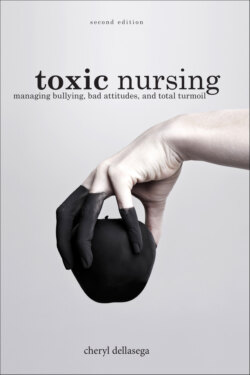Читать книгу Toxic Nursing, 2nd Ed - Cheryl Dellasega - Страница 28
На сайте Литреса книга снята с продажи.
nurse leader insight
ОглавлениеI would start by having a conversation with Rosemary to explain why some of the older nurses are feeling this way. They aren’t really targeting her personally, but it’s a reflection of a lack of understanding on their part.
To a degree, there is some validity to what Eilene and the other nurses are saying. Initially, there is a basic understanding common to BSN and AD nurses. What Rosemary needs to keep in the back of her mind is that over time her ability to think and see beyond the basic technical functions will become evident.
It may also be a lack of exposure to nurses with advanced degrees that makes the other nurses feel as if there is no difference. Rosemary needs to value the experience of her new coworkers but also remember that she brings a piece to this work environment that they do not have. The nurse manager needs to tell them the new nurse might have something to teach them, too.
The other thing the nurse manager might want to do is have a conversation with all the older nurses (including the preceptor) and let them know that while they are valued for their experience, they need to remember this is a new nurse, and they were new nurses at one time, too. They need to guide and support her in the way they wanted to be.
A general rule is, don’t judge a person by initials at the end of the name.
–Kathy Curci
The topic of ADN versus BSN nurses is a “great debate” among many. Unfortunately, the mere mention of this topic to two or more nurses will likely end in a heated discussion. Arguably, there are many pros and cons of various entry-level options in the nursing profession. Despite some program differences, both ADN and BSN graduates sit for the NCLEX-RN exam and are held to the same rigid standards for licensure and practice. The caveat to this scenario is that seasoned ADN nurses, such as Eilene and her colleagues, may feel threatened by this push for higher education in nursing because many organizations now hire or promote only BSN-prepared RNs. Obtaining a BSN is admirable and offers many pros such as job security, research-/evidenced-based practice concepts, and an overall broad knowledge base. As many healthcare organizations are in a quest for Magnet® designation, one mandate is the percentage of nurses who must hold a BSN in that organization. The BSN also provides students with an introduction to research and how to apply evidenced-based practice to nursing care. Having extensive courses in psychology or other humanities also brings the BSN-prepared nurse an eclectic knowledge base, which will help strengthen critical-thinking skills. This is not to say the ADN does not have these attributes. The ADN may indeed have acquired this through self-learned practice and continuing education. However, in the era of “proving oneself,” the lack of such a degree unfortunately supersedes one’s credibility.
Rosemary, the new BSN, is now faced with trying to defend her degree while preserving her preceptor’s dignity and credentials. The last thing Rosemary wants to do is damage her relationship with her colleagues or appear to be better positioned in the organization due to her higher degree. It may benefit Rosemary to acknowledge both the pros and cons of her degree to avoid undermining or overrating herself. Sharing her feelings and concerns with her mentors may be the best remedy to an awkward situation. For example, Rosemary could state that while she is proud of her degree and looks forward to sharing her knowledge to help move the unit forward, she is really eager to learn and grow from practical experiences set forth by Eilene and her other colleagues. New BSN graduates need to position themselves as confident in their educational pathways yet very curious in the quest to learn from those senior to them, regardless of degree. Working toward a “team approach” rather than a “me approach” is the key to overcoming degree dichotomies. Both seasoned and unseasoned RNs have opportunities to learn from one another.
–Cheri Clancy
